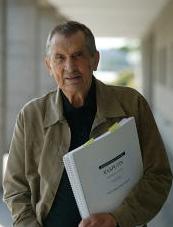The tyrants, war-mongers, and profiteers come and go, as predictable as they are destructive: and they make life hell for all around them.
But it’s possible to feel hope when we consider the immense power that comes from creative personalities who use their gifts to radiate what’s best in humanity. All the more reason to take stock of how our artists and performers so generously enhance our lives with their creative contributions.
A very happy 80th birthday indeed to the marvelous, magnanimous Philip Glass. He has changed the way we listen to music, opening up new vistas of perception and beauty.
A handy list of upcoming events to mark Glass at 80 is here on the composer’s website.
From my recent essay for Los Angeles Opera on their moving production of Akhnaten directed by Phelim McDermott:
Numbers, chanted in hypnotic patterns, set the stage for Philip Glass’s first opera, Einstein on the Beach, and the very idea of numbers underlies the revolution depicted in his third, Akhnaten: the monotheistic revolution instigated by the opera’s pharaoh-protagonist, who fatefully attempts to replace ancient Egypt’s traditional polytheistic order with the one god Aten.
Filed under: new music, Philip Glass





